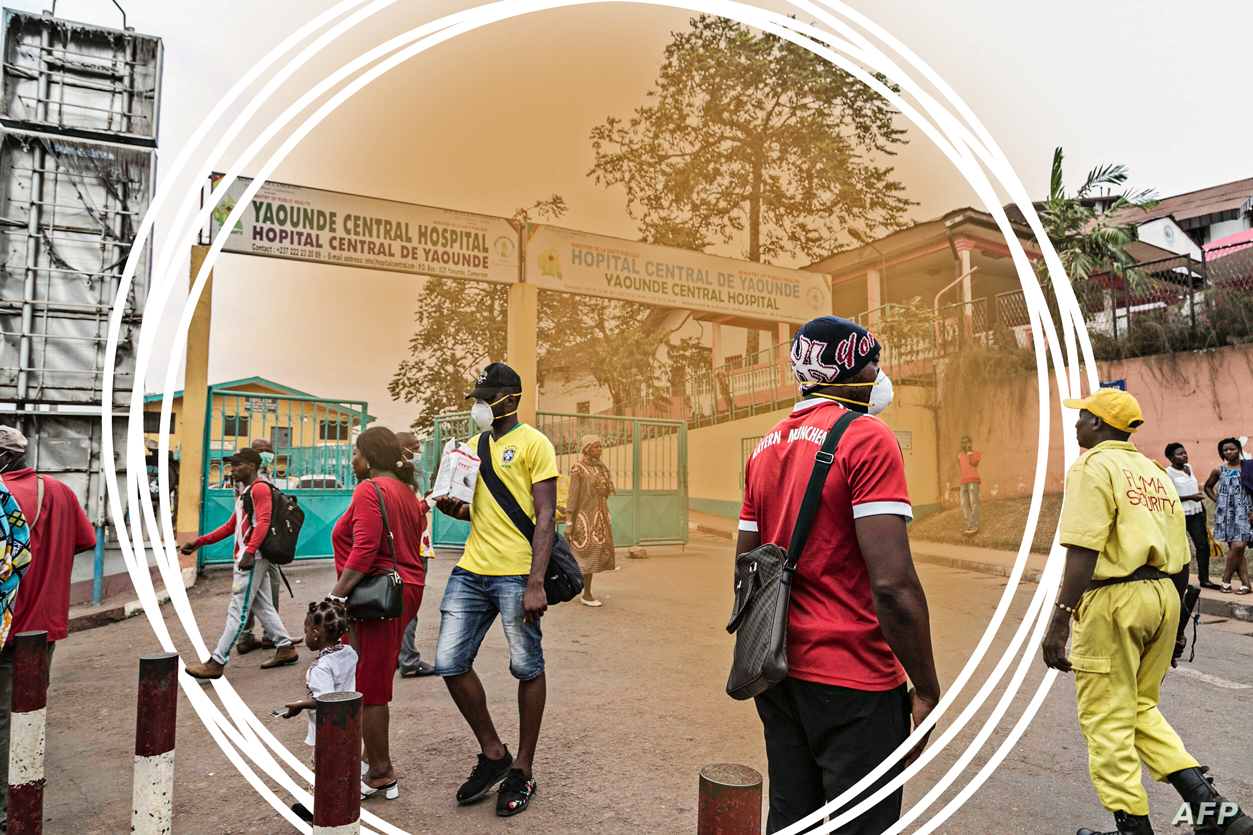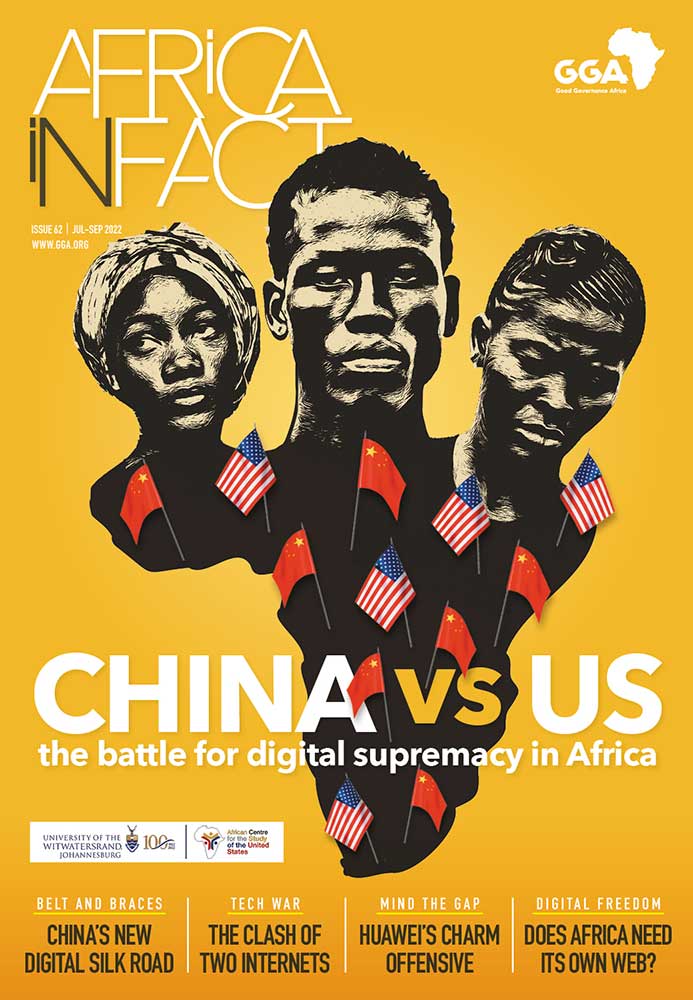
Members of the African National Congress (ANC) sing ahead of president Cyril Ramaphosa’s address during the party’s manifesto launch for the upcoming local government elections at the Church Square in Pretoria, on 27 September 2021. Photo: Phill Magakoe/AFP
As the 1 November 2021 date for the local government elections (LGE) draws closer, calls for coalition politics are gaining momentum. Political analyst William Gumede predicted before the 2019 general election, “It could be the last time the governing ANC wins an overall majority, unless the party renews itself and starts delivering on its promises to increasingly disgruntled supporters.”
Since that prediction, the ruling party has done seemingly little to address the rot, especially at the local level where it is more pronounced. While launching the ANC’s election manifesto, President Cyril Ramaphosa admitted the party had made mistakes and promised to do better. He remarked that “one of the biggest pledges the ANC makes to you is that we are doing things better and differently to make sure the best people run municipalities”.
It may be a little too late as the party has proved unable to renew itself and deliver on its promises to its increasingly disgruntled supporters. This may result in the ANC finding itself without majorities in some municipalities, and being forced to govern through coalitions.
The 2016 LGE birthed a new reality of coalition-based forms of decision-making in local government, especially in key metros. Estimates point to little variance from this equilibrium for the 2021 LGE. According to Professor Susan Booysen: “Coalitions in multiparty democracies flourish when dominant-party systems decay. When no single party wins an outright electoral majority, interparty cooperation, possible through many different forms of coalitions, becomes inevitable.” As coalition-based forms of government become the norm in the South African political landscape, especially at the most local level, it is instructive to unpack the advantages and disadvantages of coalition politics.
Coalition politics can be a useful vehicle towards strengthening good governance, as it provides more political stakeholders with a voice in how governance happens. It is assumed that parties carefully consider joining a coalition before doing so. Decisions such as whether working with the coalition is the best way to solve political and or social problems are essential. More importantly, parties must decide whether their values are sufficiently aligned with potential partners, as this will be the foundation and cement to build the coalition on.
Advantages of coalitions:
- Potential to enlarge the parties’ support bases and reach – strength in numbers
- No need to split the vote in coalition partners’ traditional strongholds
- Opportunity to appoint the best-qualified candidates from across the coalition grouping
- Can direct campaigning efforts to specific areas without the fear of being underexposed, which reduces duplication of effort and resources
- May lead to exchanges of pertinent political information, skills, and experience
- Opportunity for bringing together a diverse range of stakeholders from across the political spectrum – appeal to a wider, more inclusive audience
- Opportunity to inculcate better accountability and oversight across the coalition
Disadvantages of coalitions:
- The formations’ foundation is weak and lacks clear priorities and shared political and social values
- Forming and managing a coalition can be a time-consuming and bureaucratic process that may impede decision making on appointments, policy formulation and implementation
- The nature of coalitions tends to favour the dominant partner – power is not always distributed equally among members, causing some contestation as the voice of the smaller party may not be heard and it may be absorbed into the bigger party
- Because of differing political ideologies and divergent values, certain difficult compromises may have to be made
- Appointments of party officials can cause disagreements
- Smaller parties may become kingmakers and engage in a process of opportunism and rent seeking which can impede the realisation of good governance
As has been established, when there is no outright majority party winner at the polls, there is a need for coalition politics. As a result, political parties are forced to cobble together partnerships despite their ideological, policy or positioning on the political spectrum, to secure power. Governance scholar WO Oyugi noted: “Coalitions are a necessary evil – an evil in the sense that normally no party ever coalesces except in circumstances in which not to do so would deprive it of a chance to exercise power.”
Therefore, stemming from Oyugi’s premise, it is evident that certain parties in 2016 indeed cobbled together partnerships despite their ideological, policy or positioning on the political spectrum. However, as the events witnessed in the key metros that the ANC lost in the last election to opposition coalitions, it is evident that certain partnerships were formed with the sole objective of removing the ruling African National Congress (ANC) from power, rather than being a suitable alternative to further good governance.
Way forward
Previous Good Governance Africa (GGA) reports have illustrated the limitations of coalition politics in South Africa. When examining the coalition led metros, all have had political fallouts resulting in a change of leadership to the detriment of good governance and service delivery. This has driven a trust deficit between the citizenry and the political leaders across the political spectrum and does not bode well for the effective and efficient allocation of resources for constituents.
We anticipate that the November LGEs will result in a rise in potential coalition formations. Political parties should safeguard the promotion of good governance at all costs. They should avoid forming partnerships for selfish goals which will impede rational policy formulation and its successful implementation. The victims of this selfish approach will be the citizens and not the political parties.
Craig Moffat, PhD is the Head of Programme: Governance Delivery and Impact for Good Governance Africa. He has more than 17 years of practical experience working for government institutions and multilateral organisations. He was previously employed by the South African Foreign Service, where he worked extensively at identifying and analysing security threats towards South Africa as well as the southern Africa region. Previously, he was the political advisor for the Pretoria Regional Delegation of the International Committee of the Red Cross. He holds a PhD in Political Science from Stellenbosch University.











